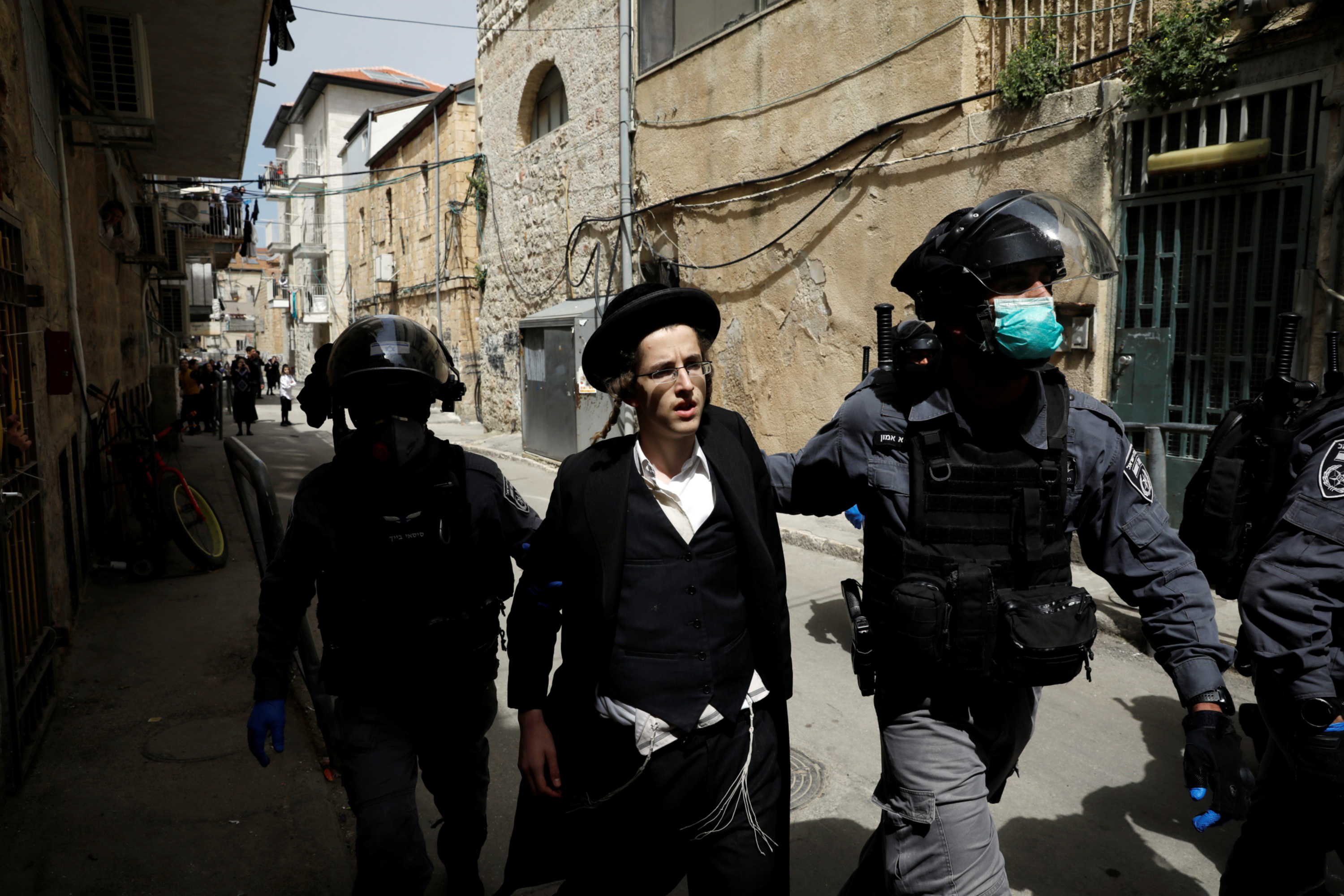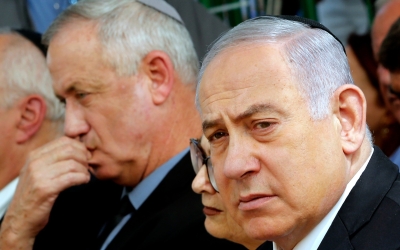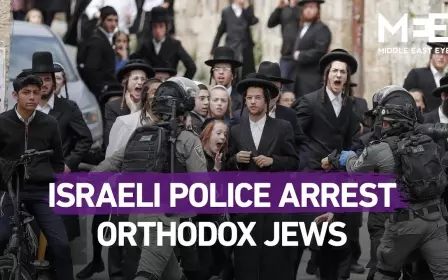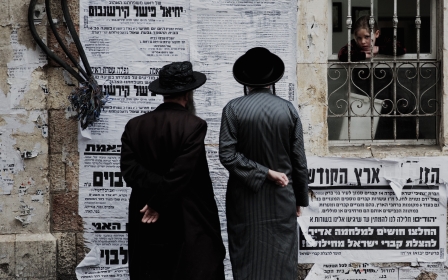Coronavirus in Israel: Netanyahu faces ultra-Orthodox backlash over handling of pandemic
For over a decade, Israel's ultra-Orthodox parties have kept Benjamin Netanyahu in power, but as the once-reclusive communities bear the brunt of tough coronavirus restrictions, the prime minister is steadily losing the support of the group's kingmakers.
The two foremost ultra-Orthodox parties, United Torah Judaism and Shas, won 13 to 16 Knesset seats in the most recent series of elections in Israel. Their support for Netanyahu was crucial to his gaining the 61 seats required to form a government.
New MEE newsletter: Jerusalem Dispatch
Sign up to get the latest insights and analysis on Israel-Palestine, alongside Turkey Unpacked and other MEE newsletters
Ultra-Orthodox parties once flaunted their role as political kingmakers, open to joining a potential government on the right or centre-left. In the last 15 years or so, however, Netanyahu and the right-wing have had a lock on their support.
The prime minister played a large part in this shift himself, perceiving the changes occurring within this very conservative sector. He saw the deepening rift between a waning ultra-Orthodox rabbinical leadership and its public, as the latter increasingly opened up to the outside world, and to social media especially.
Netanyahu began addressing the ultra-Orthodox as individuals, earning their trust. Artfully, while avoiding any disrespect towards the leadership, he spoke straight to the voters and won their hearts.
These efforts have borne fruit over the last 18 months.
Over three rounds of elections during that period in Israel, ultra-Orthodox parties became appendages of the Netanyahu-led Likud. When the mandate to form a government was awarded to centrist leader Benny Gantz, the ultra-Orthodox refused to even sit down with him at the negotiating table. They denied any knowledge of feelers from Gantz’s camp.
Worst fear
This doesn't mean ultra-Orthodox politicians are overly keen on Netanyahu. Their longtime party leaders retain a fondness for the centre-left, whose governments they joined until 20 or 30 years ago. Their personal relationships with Netanyahu were never all that great, which is true of nearly everyone who has ever found themselves close to him.
Meanwhile, during the age of social media, ultra-Orthodox politicians could not ignore their constituents’ growing attraction to Netanyahu, forcing the leadership to continue to support him unless they were prepared to lose their own voters.
Their worst fear during the last series of elections was that Netanyahu would appeal directly to their constituents and they fought hard to prevent it. They knew that they could lose a significant share of their right-wing coalition Knesset seats if Netanyahu appealed to ultra-Orthodox Israelis to vote directly for Likud instead.
Now, however, a revolution is in progress.
That same constituency that was pushing its leadership to grant Netanyahu unconditional support is now pushing it to voice reservations about him - because of the coronavirus pandemic.
Following the rising rates of contagion in ultra-Orthodox areas, some neighbourhoods and even whole towns were placed under lockdown. Those closures, and the unyielding police enforcement in ultra-Orthodox areas, has prompted a furious response. The anger on the street is pressuring the community's leadership to take action.
The issue comes down to deprivation mixed with pride.
The unique, Orthodox way of living revolves around very large families, very small apartments, and a reliance on extended family and community. All of these fell apart with the advent of the pandemic, creating difficulties unique to those communities, whose people now feel that they have no one to rely on.
Warranted or not, the restrictions on ultra-Orthodox areas have become a watershed moment.
Tens of thousands of residents have been begging the police at checkpoints for the right to receive a pass in order to get to work. Entire families have been cut off completely.
Spectre of the ghetto
Residents of these areas hear stories of what is happening in secular Tel Aviv, where there is no lockdown and life is proceeding normally - including mass protests in the streets - while in their own neighbourhoods there are checkpoints everywhere.
The emotional context of these developments is significant.
Their fathers and grandfathers lived in self-contained, closed areas and had little contact with the secular outside world. Today’s ultra-Orthodox Israelis no longer have that old ghetto mentality. They do not perceive themselves as a defensive minority, a separatist sector.
From their perspective, they are part of Israel, the mainstream.
The fact that Netanyahu and his partners have embraced them has led the ultra-Orthodox to feel wanted, in contrast to the old days under the centre-left, when they felt ostracised. Now, the coronavirus-driven closures in ultra-Orthodox neighbourhoods have evoked the spectre of those earlier times, as if they have been sent back to the ghetto.
The anger is working its way upward. For these ultra-Orthodox voters, the Netanyahu who had been their friend is morphing into a villain. The pain of betrayal is acute. The protests against Netanyahu being voiced today are hard to miss.
Until not long ago, the ultra-Orthodox parties were ignoring these feelings. Leading political figures were secretly angry at their own constituents and continued to support Netanyahu. Notable among them is Aryeh Deri, interior minister and leader of Shas, the Sephardic ultra-Orthodox party he founded nearly 30 years ago.
The first wave of Covid-19 in March and April took a heavy toll on the ultra-Orthodox population, when many of their rabbis instructed the faithful to continue studying and praying collectively as usual, despite the closures and the official directives against such congregating. Deri at that time spoke out about the need for the ultra-Orthodox public to take a hard look at itself.
With the outbreak of the second wave of Covid-19 in recent weeks - Israel has so far recorded 42,813 cases - Deri has been publicly silent but privately scorned the talk on the ultra-Orthodox street. He told close associates that lawless behaviour among the ultra-Orthodox requires strict enforcement of regulations, however burdensome.
Finally, however, the penny has dropped.
The process began with younger backbenchers from the ultra-Orthodox parties in the Knesset issuing successive statements denouncing the police and the lockdowns, but has now reached the upper echelons.
Veteran United Torah Judaism MK Yisrael Eichler has spoken explicitly about leaving the government. In ultra-Orthodox media, expressions of anti-Netanyahu sentiment are on the rise. Ultra-Orthodox MKs have felt the public’s anger and are starting to cave.
Unfazed
The shift has seemingly emerged out of nowhere.
Before all of this took place, legislators were busy preparing for what they viewed as the big battle over the state budget, due to be approved in the coming weeks.
In normal times, ultra-Orthodox MKs are accustomed to intensively working behind the scenes to secure budgets. Now, their outraged public is giving them no respite, and it’s happening at a time when the situation for their parties is grim.
Because of the economic crisis caused by coronavirus, funding for yeshivas, serving education to masses of Orthodox boys and men, has run out. The nationwide economic chaos is liable to exact a heavy budgetary price vis-a-vis the needs of ultra-Orthodox constituents.
Sure enough, an increasingly harsh tone has been evident in recent days.
Deri’s office has just issued a press release about a heated cabinet discussion between Netanyahu and Deri in which the latter declared that “as a representative of an ultra-Orthodox party I cannot accept this severe police violence, and it must be stopped”.
Likewise, Yaakov Litzman, minister of housing, who is United Torah Judaism’s top-ranked member, said he had an urgent meeting with Netanyahu “in light of the government’s conduct towards the ultra-Orthodox sector during the corona crisis”.
Netanyahu appears unfazed. He has not changed direction politically.
In the prime minister’s office, they say that “everything is fine,” and “the ultra-Orthodox are with us,” and “everything will calm down”.
But what Netanyahu has yet to understand is that the ultra-Orthodox voters who forced their political leadership to embrace him could also be the ones who force that same leadership to seek a divorce.
Middle East Eye delivers independent and unrivalled coverage and analysis of the Middle East, North Africa and beyond. To learn more about republishing this content and the associated fees, please fill out this form. More about MEE can be found here.






